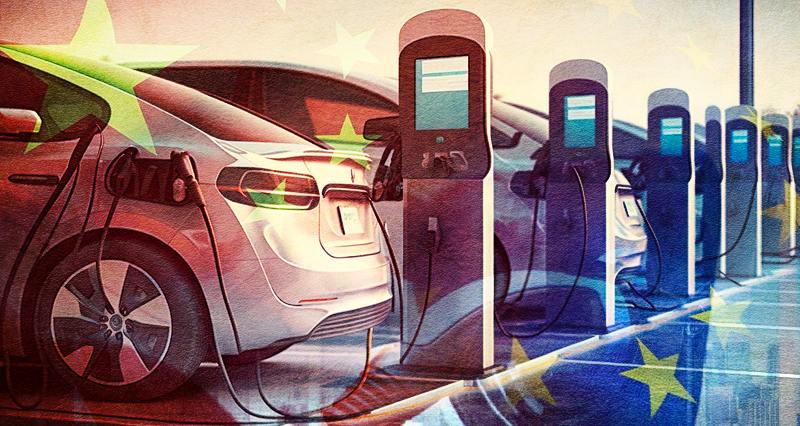EU and China Have No Choice But to Choose Cooperation Over Confrontation
EU and China Have No Choice But to Choose Cooperation Over Confrontation
By Mehmet Enes Beşer
Risk of an imminent trade war between the European Union and China on electric vehicles (EVs) has increased to become arguably the most pernicious flashpoint on today’s economic landscape. This is less about gaining access to markets or marginal tariff levels—but the very conceptualization of international cooperation on clean technology, climate guardianship, and economic stability. As both sides step closer to the potential agreement over anti-subsidy investigations, the world waits with bated breath. Pragmatism or geopolitics: which shall prevail?
What is true is this: a trade war over EVs is neither inevitable nor welcome. It is a challenge of political maturity for the EU and China—a time to show that great powers can find common ground without resort to zero-sum. At a time of climate emergency, hindering the transition to EVs through tit-for-tat tariffs would be self-defeating. Diplomacy needs to take the driver’s seat.
Understanding the Origins of the Controversy
The EU’s planned imposition of up to 35.3% anti-subsidy tariffs on Chinese-assembled EVs is premised on allegations that state-sponsored advantages are allowing Chinese automobile producers to sell below European producers. China responded by launching investigations into European goods like brandy and pork, showing its readiness to retaliate if tensions escalate.
At its core is a strategic fear: that a flood of low-cost, high-quality Chinese EVs will weaken its domestic auto industry—a decades-old bastion of European employment, innovation, and export prowess. For Germany and France, protecting the industry is not merely economic policy—it’s survival.
China, on the other hand, argues that its EV success is a result of decades of rightful industrial policy, fair market competition, and international demand—and not of unfair subsidies. It points to its willingness to negotiate and has made gestures towards compromise, such as negotiations over a potential “price commitment mechanism” aimed at avoiding an all-out tariff war.
The Cost of Confrontation
And if this escalates into a trade war, then both sides lose. European buyers would pay extra for EVs, undermining uptake and delaying the continent’s environmentally friendly mobility dreams. European auto makers, who are already caught up in catching up with the innovation curve and rising production costs, would find retaliatory levies in China—a strategic market for expansion—making them less competitive still.
For China, tariffs would constrict entry to one of the globe’s wealthiest EV markets, retarding its growth globally at a vulnerable point when overcapacity fears and saturated domestic demand loom in the future. For all, however, the reputational damage of harming both sides—most spectacularly so in the developing world—would be monumental. It would mean that even clean technologies are now being held hostage to geopolitics.
A Shared Climate Imperative
The EV dispute is particularly ironic in its timing. The EU and China have set ambitious climate targets. Europe’s Green Deal commits to making the continent carbon neutral by 2050. The world’s biggest polluter, China, has committed to peaking before 2030 and reaching carbon neutrality before 2060.
Electric mobility is central to achieving these goals. Any slowdown in the introduction of EVs—be it through legislation hurdles or market fragmentation—puts the world climate timeline at risk. Convergence between the two largest EV markets on the planet is therefore not just nice—it’s essential.
The way ahead has to be through coordination, and not coercion. That means collective efforts in establishing global standards for EV safety, emissions, and recycling; joint investments in supply chains in battery production and rare earth sustainability; and consumer subsidies that are open and WTO-compliant.
Reframing the Narrative: From Threat to Opportunity
Europe also must move past its own protective rhetoric. Instead of seeing Chinese EVs as a threat, it should welcome them as a catalyst for industrial rebirth. Chinese competition already has encouraged European manufacturers to question old designs, invest in new technology, and prioritize affordability.
The recent EU moves to ramp up domestic battery manufacturing, cut permitting rules, and subsidize re-skilling programs are on the right track. But none of these require a trade war. They require investment, coordination, and confidence.
Similarly, China can take this opportunity to signal openness—not to negotiation, but to long-term reforms. Focusing on transparency in subsidy programs, reciprocal market access, and consumer trust abroad are not concessions—they are needed steps to become a true global leader in green technology.
Diplomacy in Action: The Role of Dialogue
The negotiations between China’s Commerce Minister Wang Wentao and EU Trade Commissioner Valdis Dombrovskis suggest both sides are aware of what is at stake. The proposed framework for price commitments, bureaucratically complex as it is, offers a diplomatic off-ramp. In reaching consensus on common benchmark standards for export prices, both sides can claim a win: Europe gains insulation from market manipulation, and China avoids retaliatory tariffs.
Technical specialists, regulatory experts, and entrepreneurs must now be empowered to do what politics all too often gets in the way of—address problems pragmatically. The next few weeks are crucial. If this opportunity is missed, the tariff-retaliation merry-go-round could become an endless ride.
Conclusion: Trade Peace for a Green Future
In a world shattered by war, pandemic scars, and climate meltdown, the EU-China EV war is more than a bilateral squabble. It is an experiment in the future of trade governance and green development.
By avoiding a trade war, China and the EU can set a robust precedent: that climate technologies are too important to be left to competition, that diplomacy can still keep pace with provocation, and that great powers can choose partnership over protectionism.
The EV revolution is our greatest chance at decarbonizing transport worldwide. Let’s not let it be derailed by short-term politics. The road to a green tomorrow is long—and we can drive it only together.

















Leave a Reply